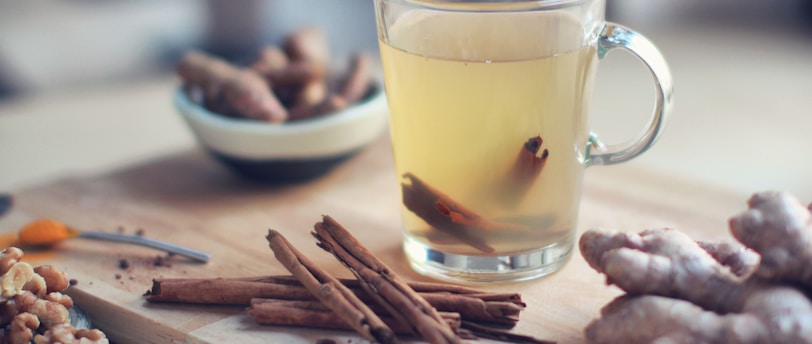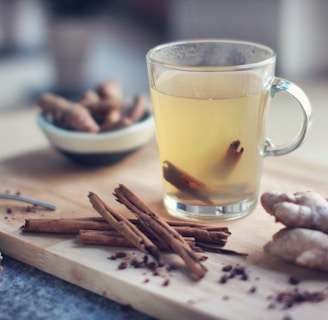Ginger and cinnamon are best friends
cozy herb companions for fall & winter
COOKINGHERBALISM
4 min read


This article is not, and should not be considered, medical advice. ROOTED does not assume any risk or responsibility for any information we share.
When I think ginger and cinnamon, I think cozy. One sniff, and I’m immediately transported to an overcast autumn day, bundled up with a thermos in hand while I do one of my many tasks outdoors. Ginger and cinnamon are great “starter herbs” for those interested, but new, to herbal medicine. The ingredients are accessible and affordable, the flavors are familiar, and they are generally safe for most people (more on that below).
The standard disclaimer that most people give about incorporating any herbal products into their life seems always to be, “talk to your doctor first.” While this can feel like a necessary step to protect oneself from liability, I bristle at it, especially if it's about something as common as cinnamon. Most people already consume it sometimes, probably without asking their doctor if it's ok, so why should you suddenly ask now? Most people don’t, and won’t, ask their doctor for permission before consuming something with cinnamon in it. The exception is for diabetics, who need to closely monitor their blood sugar. Therapeutic doses of cinnamon can have such a profound effect on blood sugar that it may cause a need to adjust their medication, so in this case, it should be discussed with the healthcare team. Not every herb is appropriate for every person and just because something is natural doesn’t mean it's safe. Some plants interfere with medications and have contraindications with certain healthcare conditions.
That being said, most western doctors haven’t had any training in herbalism, so despite the fact that they are considered the epitome of health knowledge, they usually aren’t in a position to give an educated answer about if an herb is safe or not. I believe wholeheartedly that people should do their own research, check possible contraindications against their medical conditions, and ultimately decide for themselves what they are comfortable with (especially if the plant in question is a food found at the grocery store).
The flavors of ginger and cinnamon pair nicely together, and their teas are prepared the same way. They come from the same area of the world: it makes sense that they work together so well. Ginger is a rhizome and cinnamon is a bark- both benefit from being decocted (boiled in water for about 20 minutes to extract the nutrients). For this preparation, cinnamon sticks, rather than powder, is better. These herbs shouldn't just be steeped; a lot of nutrition is left behind when they are.
Cinnamon is talented at modulating blood sugar. While those who are diabetic and are on meds for their diabetes should consult with their medical team before incorporating therapeutic doses of cinnamon into their diet, those who are at risk, are becoming insulin resistant, and who struggle with high blood sugar (without being diabetic) might consider incorporating this plant into their routine. Cinnamon is well-known to help folks with high blood sugar and insulin resistance. This is because some constituents in cinnamon have insulin-like properties, which “enhance glucose uptake by activation of insulin receptor kinase activity, and autophosphorylation of the insulin receptor, in addition to stimulation of glycogen synthase activity.” In a 2013 meta analysis, it was reported that consuming cinnamon can result in statistically significant health improvements, including a decrease in levels of fasting plasma glucose, total cholesterol, LDL-C, triglyceride levels, and an increase in HDL-C levels.
Ginger is a modulator; specifically regarding the microbiome. It helps control and mitigate overgrowths of pathogens, without killing the gut flora that you need and want. In one human study specifically examining the effects of ginger juice supplementation on 123 healthy adults, levels of pro-inflammatory bacteria were decreased and anti-inflammatory bacteria increased in the gut after consuming ginger juice every day for just one week. The exact mechanisms of why this happens are still being investigated, but we know that constituents in ginger like gingerol and shogaol are absorbed rapidly in the small intestine, and are metabolized by microbes in the gut as well. Another study explains that some nanoparticles from ginger contain RNAs that alter the microbiome and the host physiology in a positive way. Ginger provides nourishment for both the microbes and the human.
Ginger and cinnamon are superstar plant allies in their own right, and they go to bat for human health. Consuming them alone is likely to provide health benefits, but consuming them together is even better. In one animal study, diabetic rats consuming cinnamon and ginger together showed improvement in all investigated parameters and improved more than the groups receiving cinnamon alone and ginger alone. In this study, rats given the combination of ginger and cinnamon brought diabetic rats to near normal range for triglycerides, cholesterol, lipoproteins, plasma glucose, antioxidant enzyme systems, enzymatic antioxidants in liver tissue, and insulin. The rats given the combination of cinnamon and ginger showed more improvements than the groups given just cinnamon and ginger alone, and the results were evident and dramatic after just four weeks. It was ultimately concluded that the combined formulation was more effective than the separated herbs.
Cinnamon modulates blood sugar and ginger modulates the gut microbiome. In western herbalism, both are considered warming, but where ginger is drying and relaxant, cinnamon is moistening and tonifying. Together, they form a balanced formula that is likely to sit well with just about any constitution, especially in the colder months.
Herbalism was the only form of medicine for most of human history, and still is the most utilized type of healthcare for many people. As times have changed and herbalism became secondary to western medical systems (in some places and for some people), the herbs that have remained in our diets, cultures, and stores have persisted because they are so important to humans. These are the plants that we should look to first as our greatest allies- they are the ones that our ancestors decided they simply couldn’t go without.
This post originally appeared on The Blueberry Patch, the newsletter from the herbal company Blueberry Road Botanicals, and is reprinted here with permission.

CONTACT
rooted@eatingrooted.com
JOIN THE EMAIL LIST
EAT
ROOTED
© 2023 - 2024
@eat_rooted
@eatrooted
